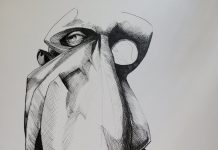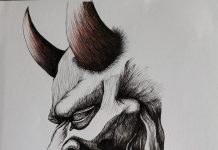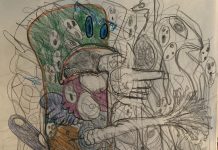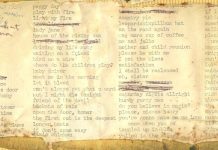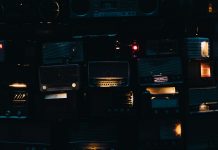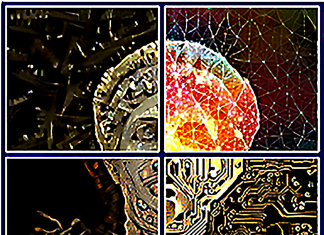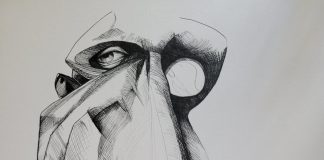We’re told it’s only been unleashed one time
by a lone fanatical guerrilla sent
by some silent foreign power. People talk
about him all the time, but most don’t dare
say too much about his self-immolation—
how he cold-bloodedly provoked the fury
of priests and prefect to detonate
the deadly charge of love strapped to his heart,
damn near putting an end to everything.
Even now we don’t know the whole scary truth
of what happened after that conflagration,
those three dark days verging on apocalypse,
how close we came again to shapelessness and void
and darkness upon the face of the deep—
and without doubt it’s just as well. The wise
illuminati who rule from shadows might
someday make public those seven files sealed up
some two thousand years ago, but only
when we’re ready for the truth—and frankly,
I wouldn’t hold my breath for that fine day.
The vestiges of ruin lie all around us.
We’re damaged, too, in our guts and in our souls.
Nobody could foresee back when it happened
the terrible genetic consequences
such an indiscriminate weapon would wreak
on generations yet unborn—the seizures,
the boils, the lesions, the burning eruptions
of morality and justice, pandemic
outbreaks of conscience and goodwill,
and worst of all, the mutant and grotesque
progeny too crippled and misshapen by
compassion for the cruel works of a sound
and robust functioning society.
But by the skin of our teeth, as they say,
humanity pulled through, and here we are
today, a heartier species than ever.
There’s no denying, though, we have been lucky.
The role of diplomacy has, I think,
been overstated. Scant progress has been made
by sovereign global powers to dismantle
their silos and armories, their insanely
massive stockpiles of lethal lovingkindness.
(So weird, all this frenzied hoarding of something
too terrible to contemplate its use!)
Worse, attempts to halt the proliferation
of agape have been a laughingstock—
the same with eros, philia, and storge.
Would-be Jesuses find such materials
in their kitchens, and instructions and designs
are available on the Darkest Web.
As the experts say, it’s not a matter of if,
but of when, and we are long overdue.
This time if one lone zealot sets off the spark,
the critical mass of deadly altruism
will be more than sufficient to destroy
civilization several times over,
leaving nothing but the naked infrastructure
of human bodies, guileless and zombified,
baffled by purposes and meanings you
and I take for granted—the pedagogic
utility of sweatshops; the culinary
smorgasbords of mass assembly lines;
the pious, sweet indentured duties of
the supermarket aisle; office cubicles
where we roam at liberty in our endangered
tameness as if in our natural habitat …
What use are these, our mindless heirs will ask,
their limbs and gazes alike entangled in throes of folly,
now that we have fallen in love?




